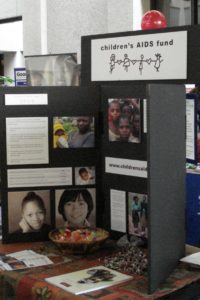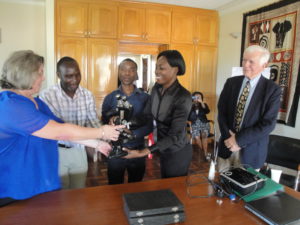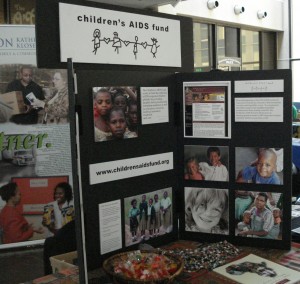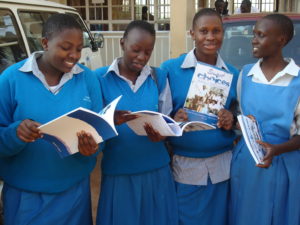CAFI at Richmond 2014 Combined Federal Campaign Kick-off Event
 Federal employees and members of the Armed Forces stationed at Defense Logistics Agency Aviation (DLA) Defense Supply Center Richmond, VA kicked off the 2014 Combined Federal Campaign (CFC) on September 23, 2014. The Children’s AIDS Fund International (CAFI) was one of 30 charities invited to attend the celebration boasting this year’s theme: “We Make it Happen”.
Federal employees and members of the Armed Forces stationed at Defense Logistics Agency Aviation (DLA) Defense Supply Center Richmond, VA kicked off the 2014 Combined Federal Campaign (CFC) on September 23, 2014. The Children’s AIDS Fund International (CAFI) was one of 30 charities invited to attend the celebration boasting this year’s theme: “We Make it Happen”.
In 2013, federal employees from the Central VA CFC Region donated over $866,765 dollars to participating CFC charities.
The CFC of Central Virginia, the local campaign for federal employees in the Richmond, VA area, is one of two CFC campaigns located near the CAFI offices in Northern Virginia. In 2013, federal employees from the Central VA CFC Region donated more than $866,765 dollars to participating CFC charities. Charlie Lilli, Deputy Commander DLA praised the efforts of the federal employees who contributed last year even though they faced furloughs, tighten budgets and cost reductions, and is certain they will meet and exceed this year’s goal.
In 2013 alone, federal employees, including military personnel, donated more than $51 million dollars to participating CFC charities. CAFI has participated in the CFC for more than 16 years, raising thousands of dollars for HIV impacted children and their families.
If you know someone who works in the federal government or is in the military please let them know about the important work CAFI is doing to help limit the suffering of children and families affected by HIV. Ask them to visit our website and read about our ongoing programs which benefit thousands of children and families, or better yet forward them an email highlighting our work.
Thanks very much for your help.
 On a recent trip to Uganda, Children’s AIDS Fund International (CAFI) President Anita Smith (left) presented a Bausch & Lomb medical microscope to the Family Hope Centre Kampala staff. The equipment was donated by CAFI board member Russell Smith, president of Organization Communications Incorporated (OCI), headquartered in Northern Virginia.
On a recent trip to Uganda, Children’s AIDS Fund International (CAFI) President Anita Smith (left) presented a Bausch & Lomb medical microscope to the Family Hope Centre Kampala staff. The equipment was donated by CAFI board member Russell Smith, president of Organization Communications Incorporated (OCI), headquartered in Northern Virginia. September heralds the beginning of the 2014 State Employee giving campaigns. The Children’s AIDS Fund International (CAFI) is participating in 17 campaigns throughout the U.S. These state campaigns are an important fund raising source for CAFI. The Maryland State Employees and Retirees once again lead the way with over $2,100 pledged last year. Thank you Maryland!
September heralds the beginning of the 2014 State Employee giving campaigns. The Children’s AIDS Fund International (CAFI) is participating in 17 campaigns throughout the U.S. These state campaigns are an important fund raising source for CAFI. The Maryland State Employees and Retirees once again lead the way with over $2,100 pledged last year. Thank you Maryland!
 This summer while many students spent their school break on family vacations, one student chose to spend some of her time volunteering at the Children’s AIDS Fund International (CAFI). This incoming sophomore decided she wanted to learn more about HIV and its worldwide impact .
This summer while many students spent their school break on family vacations, one student chose to spend some of her time volunteering at the Children’s AIDS Fund International (CAFI). This incoming sophomore decided she wanted to learn more about HIV and its worldwide impact . With the dramatic increase in the number of patients on HIV treatment over the past decade and the recent still controversial emergence of pre-exposure prophylaxis (PrEP) programs, more and more experts assert it is possible to treat our way out of the HIV epidemic. Clearly increasing data supports that position because HIV positive individuals on treatment are much less infectious and, thus, less likely to transmit HIV to an uninfected partner.
With the dramatic increase in the number of patients on HIV treatment over the past decade and the recent still controversial emergence of pre-exposure prophylaxis (PrEP) programs, more and more experts assert it is possible to treat our way out of the HIV epidemic. Clearly increasing data supports that position because HIV positive individuals on treatment are much less infectious and, thus, less likely to transmit HIV to an uninfected partner.